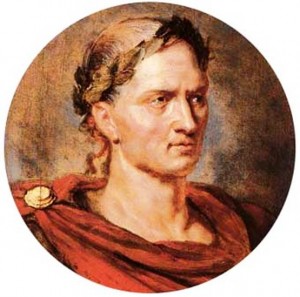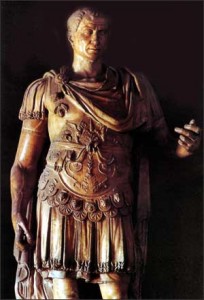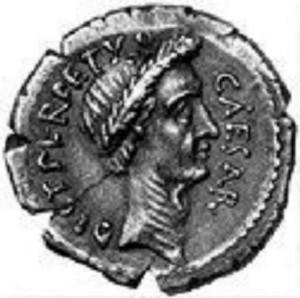 I don’t know about you but when I think of the Roman Empire the first soldier that comes to mind is Gaius Julius Caesar. I’ve probably seen every movie out there that has Roman soldiers in it. Ben Hur was the first movie I saw at 8. Another favorite is Gladiator. There was the TV series Rome that sadly only lasted 1 season due to costs. But what do we know about him that they didn’t show? Is there more to his legend? What really caused the Roman Republic to fall?
I don’t know about you but when I think of the Roman Empire the first soldier that comes to mind is Gaius Julius Caesar. I’ve probably seen every movie out there that has Roman soldiers in it. Ben Hur was the first movie I saw at 8. Another favorite is Gladiator. There was the TV series Rome that sadly only lasted 1 season due to costs. But what do we know about him that they didn’t show? Is there more to his legend? What really caused the Roman Republic to fall?
In 2004 I was walking through a Borders store and stumbled upon the history section and found myself thumbing through a book about Julius Caesar and his 13th Legion. It was fiction written with historical facts and as I read on it got me thinking. The more I learned about him the more real he started to become. Instead of just heroic tales I was now learning of difficulties he and his men endured. Most historians believe he was afflicted with epilepsy. That’s quite the physical ailment to overcome and he never let it stop him. He also struggled with his baldness and often felt self-conscious about it. Bet you didn’t expect that from a world conqueror. It is said that this was one reason he loved wearing the reef. For those of you that don’t know, the reef was presented to conquering generals when returning to Rome and presented before the people in the way of riding a chariot throughout the city. It intrigues me that these “inadequacies” to him seemed to have made him stronger. He turned to his strengths instead of letting these things pull him down. I think it’s fair to say he overcame his fear and insecurities.
Julius Caesar didn’t become Caesar in one day though. He paid his dues in both politics and in the military. He was born to an aristocratic family in 100 BC and lived till 44 BC. The family claimed descent from the goddess Venus, a notion that Caesar would subtly reinforce throughout his life to strengthen his power and popularity. Caesar combined bold action and cunning political instincts to build a dynasty of emperors that would endure for centuries. He outlasted Pompey in the Roman Civil War. You might have even heard of his famous words, “Let the die be cast” (“alea icta esto”) when he crossed the Rubicon (Italy’s frontier boundary) to start the civil war. In victory he was saddened when he received Pompey’s head from the Egyptian Pharaoh. You see, at one point they had been allies and it was ultimately power and a corrupt government that turned Pompey against him.
Julius Caesars Legend
His vision for The Roman Republic that ultimately cost him his life.
I used to wonder if Julius Caesar was just a military man who declared martial law and then became a dictator. It is true that he was a dictator, but that was after the senate appointed him dictator. A position granted to someone to have sole power if the republic was falling apart or in an emergency. So what would case the senate to give their power up? Well, let’s start with what a republic is. A republic is a government voted in by the people. Sound similar? It’s what we have in the US. So if that government becomes corrupt or the voting process gets corrupted what do you do then? Julius Caesar believed in the purity of the republic and wanted to return it to that. His whole life he watched powerful men, either governors, generals or politicians, become more powerful than the elected government. Provinces fighting each other instead of a united government voted in by the people. Julius Caesar wanted to return Rome to what made it powerful in the first place. So after defeating Pompey in the Roman Civil War the senate appointed him dictator and he only accepted it so that he could clean out the remaining political nests of corruption and bribery.
His triumph and election was unfortunately short-lived. A conspiracy was formed to assassinate Julius Caesar on the Senate floor. Although warned by his doctors, friends and his wife and a note passed to him as he entered the Senate chamber, Caesar went to his fate. The senator Brutus, who was a trusted friend, was one of the attackers. During the civil war, the Senator Brutus had aligned with Pompey against Caesar, but Caesar had forgiven him and admitted him back into his private circle. Many believe it was the betrayal of Brutus that caused Caesar to cover his face with his toga and submit to the attack. In Shakespeare’s play Julius Caesar his last words are, “You too, Brutus?” (“Et tu, BruteI?).
After this Julius Caesars right hand man and second in command, Mark Antony, along with Octavian (later to be known as Caesar Augustus) and Lepidus formed an alliance and defeated Julius Caesar’s enemies. As many of you know Augustus and Mark Antony ended up splitting the empire between east and west and then eventually fighting each other. And with Augustus’ victory he became the first Emperor and 10 more succeeded him. With the death of Julius Caesar the Republic died also. A senate still existed but couldn’t challenge the emperor. It was a defining moment in Roman history. Caesar Augustus did continue to pursue and eventually accomplished Julius Caesars goal of unifying the Roman Empire.
Some other interesting inventions attributed to Julius Caesar are the Julian Calendar and one of our first encryption techniques called the Cesar Cipher. I’ll be writing about Cryptography Friday so stay tuned.
Interesting post. My undergrad was in History, but I can say that I really do not know a lot about Caesar…other than what I’ve seen in movies. And, of course, we both know that if it’s in a movie, then it HAS to be true. 😉 I am looking forward to your post on Friday!
Thanks John! I’ve been doing some studying on cryptography. Hopefully the post will be interesting for all.
I remember that we learned something about Caesar in Latin class in high school, but for the life of me, I can’t remember what. Aside from the fact that he apparently never said “Et tu, Brute?”
If you are interested in Rome and the Caesars, you may be interested in I, Claudius, the autobiography of the Emperor Claudius who was a big Republican all the way up until he was named Emperor.
I remember learning that little bit too. It was a common phrase thrown around that was attributed to Caesar and it really gained notoriety when Shakespeare put it in his play. I do remember learning a bit about Claudius but I’ll need to check out that book to get the real details. Thanks for commenting!
I remember very few about him from classes but remember many facts from the game Total War:Rome and from one small article: http://www.bestessay.com/essays/distinct-characterization-in-william-shakespeares-julius-caesar.php, don’t know why :,
Thanks for commenting! I remember that game too. I think I actually played it a bit too. Unfortunately my comp was too slow and it lagged. Interesting article also.
I’m a huge fan of the Roman Empire as well John. I guess it began as I studied four years of it in high school (I thought I was the only one Edward).
Have you caught any of Spartacus on Starz? It’s a great show from the perspective of the Roman slaves and gladiators.
JW, glad to hear you’re also a fan! I have seen a few episodes of the first season. But for me it was a bit too gory and sexual. I loved the movie 300 and the action but Spartacus just didn’t do it. Have you seen the Rome TV series?
First, Gaius Julius Caesar wasn’t ever an emperor, he was elected Proconsul of Rome and was made Dictator for Life by the Senate. The Roman Empire came into existence when his adopted son, Octavian. who later changed his name to Augustus, decreed that the Republic was now an Empire.
Good eyes. You’re right that Augustus was the first Emperor. I do mention that further down and calling Julius Caesar an Emperor was just an overlooked mistake. Thanks for pointing that out.